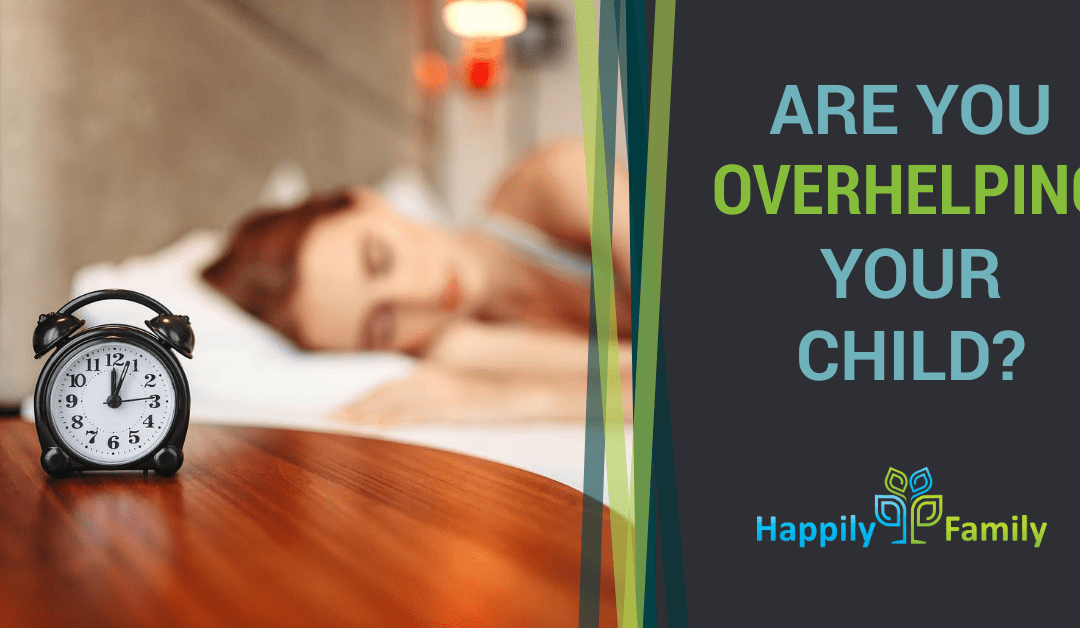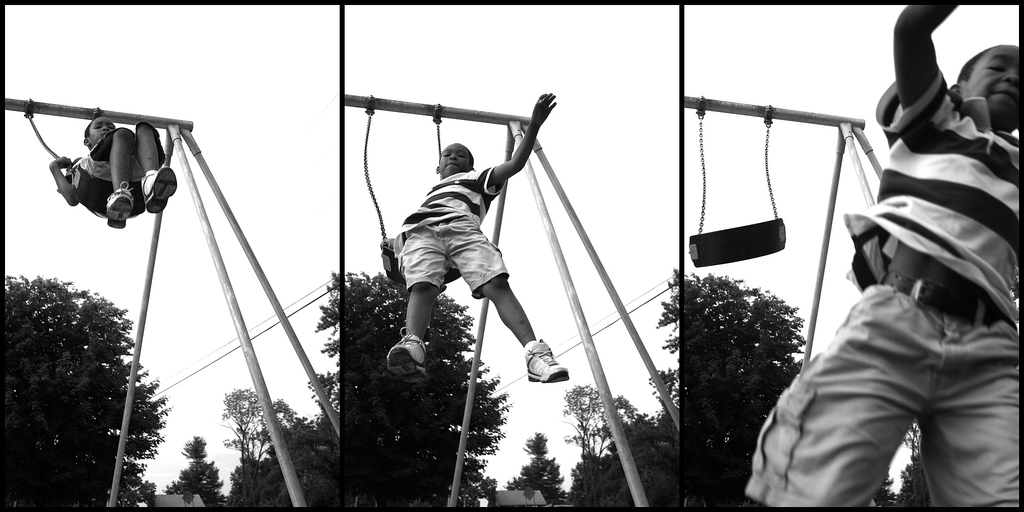How do you know if you are overhelping your toddler or teen?
It can be difficult as a parent to watch our kids struggle… whether it’s stacking wood blocks or getting to school in the morning.
Let me tell you a story…
Last spring one of our teens was having difficulty getting up in the morning to get to work and school on time. We would go into their room and wake them up (sometimes pulling off the covers, turning on the light or playing annoying music, even threatening to use a spray bottle of water).
This same teen went off on a trip this summer and was able to get up at 6am, 5am, even 4am(!) without help, and get the rest of their group up too!
What’s the deal? Why was our teen able to do something so well in one setting and so poorly in another?
Simply put, we were helping our child too much.
As parents, it’s part of the job description to be helpful and supportive. Infants come into the world completely helpless and they rely on us for everything. It feels so good to us to do things for our kids as they grow up. It feels good to be needed and to contribute.
But what if you are overhelping?
Overhelpful Parenting Has a Dark Side
If we give our kids more support than they need, they get the message that they aren’t capable. When we overhelp, our kids don’t get the chance to practice, make mistakes, and find out what works (and what doesn’t work) for them.
Overhelpful parenting undermines our kids' confidence and takes away the pride that they feel from a “job well done”.
You might be thinking, “Ok I get it. But how do I stop overhelping if all I see is that they really aren’t capable? What if I help less and they just fail? Helping less won’t magically make them do xyz without help.”
Or you might be thinking, “How do I know if I’m overhelping or under-helping? I don’t want my child to feel that I’ve abandoned them when they really aren’t capable.”
These concerns make total sense to us.
So on the blog today we’ll share how to “calibrate your helping” so that it’s not too much or too little for your kids.
Image of the Child
When Jason and I taught preschool together one of the principles that we talked about with the parents of all our students is the “Image of the Child”.
The “Image of the Child” concept comes from Reggio Emilia schools in Italy. The basic idea is that the image that we have of our children in our head influences how we respond to them. If we think of our kids as “strong, resilient, and capable” then they tend to act more strong, resilient and capable. But if we think of our kids as “fragile, weak, and needing protection” then they will act more fragile and weak. Even if we don’t say anything out loud to our kids about our view of them, they will still have a sense of what we think of them and respond accordingly.
At our former school, we encouraged the parents to have a strong image of their child. We asked the parents to let their preschool-aged children carry their own backpacks and lunchboxes, to let their kids dress themselves, to teach their children to wipe themselves while toileting, and wash their hands all by themselves.
At the school, we taught our 3-year-old students how to use scissors, low melt glue guns, real hammers, nails and saws, real knives to chop vegetables, and hot skillets to cook food. We taught them to gently handle the school pets including rats, a boa constrictor, and a tarantula.
As a result, these kids felt good about themselves. They were competent and confident. They were proud that they could climb to the top of the climbing structure without help, get on and off the swings by themselves. If they got hurt, they knew where the first-aid ointment and bandages were.
You might be thinking, “Ok I get it. I need to think of my child as more capable. But what if all the evidence points to their lack of ability? Just because I think of them as capable doesn’t mean that they will magically be able to get up in the morning without help.”
This is true. This “Image of the Child” stuff is not a quick fix every time.
But I’d like to invite you today to think about your “Image of YOUR Child” with these quick journaling prompts. If you have any questions or comments, feel free to write to us in the comments section below.
Journaling Prompts
- What words would you use to describe your child? Be honest with yourself. Pick 3-5 words and write them down (e.g., resilient, competent, and strong, or irresponsible, disorganized, and sloppy)
- Are there qualities that you would prefer to see when you look at your child? If so, list them below. Limit yourself to 3-5 qualities. (e.g., instead of seeing your child as undependable and distractible, you’d like to see them as responsible and dependable.)
- When you look at the list of positive qualities, write down one example of when or where you’ve seen your child act that way. (e.g., if you think of your child as selfish, but you want to see them as generous, think of where in their life they act generous and write it down. “My child acts generous when they volunteer at the food bank.”)
Bonus Exercises
- Write on a sticky note or scrap paper the 3-5 positive qualities that you want to see in your child and put it in a place you will see it often, like the bathroom mirror, to remind yourself to look for these qualities in your child.
- Tell your child that you’ve been overhelping in a specific area and that you are going to stop. (e.g., “After seeing that you were able to get up each morning during your trip, I realize that I’ve been overhelping to get you up in the morning. So from now on, I want you to know that you’re responsible for getting up on time. You are in charge of making sure you don’t sleep through your shift at work or your classes. If you want my help on a particular day, it’s okay to ask for more support, but it’s your responsibility.”)
A Final Thought
If you’ve gone through these questions and exercises but you're still not sure if you are overhelping or “helping just right”, then tune into your feelings. When you help your child, ask yourself how you feel. When parents overhelp, they are most often responding out of worry about being judged, fear, concern, or self-protection. If you’re feeling scared for your child, you probably have very good reasons to be fearful. However, parenting from that fearful place can have a negative impact.
Rather than responding unconsciously to our children from a place of fear, we often can be more effective if we recognize where the fear is coming from and help empower our kids, then we are less likely to overhelp.
Ask yourself…
- What am I feeling?
- Where are these feelings coming from?
- What is my worst case scenario in this situation?
- What can I do to soothe or reassure myself?
- Am I doing something for my child that they are able to do for themselves?
Ask your child questions like…
- Do you feel safe in xyz situation?
- How do you know that you are safe?
- What can you do if you start feeling unsafe?
Asking these questions will empower your child, keep them safe, and reassure yourself that your child has the skills to be competent in that situation. Certainly, it’s not a guarantee of safety, we don’t get guarantees in life, but you’ve stacked the odds on your family’s side.
Check out what Dr. Tina Payne Bryson said about overhelping kids in this excerpt from our conversation with her.
Our Happy Ending
After our teen came back from their trip, we viewed them differently. We saw them as capable and competent. We not only put them in charge of getting up in the morning by themselves, we also asked them to contribute more around the house, like cleaning the bathroom, doing the dishes, and managing their schedule.
As a result, our teen is doing chores more frequently, riding their bike to work, and being more responsible. But that’s not the best part.
The best part is that our teen is seeing themselves as more capable and competent too.
If you have any comments or questions about this blog post, leave them in the content below. We read every comment.
If, after reading the blog today, you’re interested in stuff like this WITH me… here’s how you join the Village.
You and I can personally talk in there if you’re struggling to figure out how to talk to your child.









